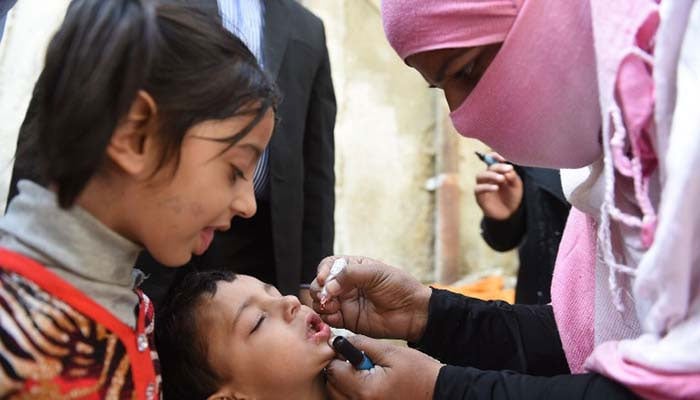Pakistan has largest number of ‘zero-dose’ children: WHO
Pakistan is one of the countries with the highest number of ‘zero-dose’ children who have not received routine immunisation
ISLAMABAD: Pakistan is one of the countries with the highest number of ‘zero-dose’ children who have not received routine immunisation. But it is the only country among ‘zero-dose’ countries which has made progress to reduce the number of unimmunised children, World Health Organisation (WHO) country representative to Pakistan Dr Palitha Mahipala said on Friday.
Speaking at a meeting of the National Immunisation Technical Advisory Group (NITAG) here at a local hotel, Dr Palitha said Pakistan also has the largest mobile population in the world, where thousands of buses and trains transport hundreds of thousands of people from one place to other on daily basis.
“Every day, 100 buses bring Afghan nationals from Peshawar and other parts of the country to Karachi. Vaccinating children of such a large mobile population is a real challenge. Pakistan has the potential, resources and willingness to immunise as many children as possible. So, we need to move forward and address these issues,” Dr Palitha maintained.
The WHO representative called for motivating vaccinators to do their best to reach the maximum number of children, especially ‘zero-dose’ children and hoped that within two-three years, Pakistan can immunise 90 percent of its children.
Chair of the NITAG Dr Khalid Shafi said a good thing has happened in Sindh where the provincial assembly has passed the Sindh Promotion and Protection of Breastfeeding and Children Nutrition Bill 2023, according to which baby feed industry representatives would not be able to visit health facilities, while formula milk would only be sold at pharmacies and medical stores on prescription.
“It is hoped that other provincial assemblies and National Assembly of Pakistan would also follow the Sindh Assembly and pass such laws to promote breastfeeding, which is a major intervention along with vaccination to protect children from ailments,” said Dr Khalid Shafi.
He maintained that despite having top-quality vaccines free of charge and available to children, vaccine coverage was very low, deploring that children in cities like Karachi were dying due to vaccine-preventable diseases like Tetanus and Diphtheria.
“A few days back, I visited the National Institute of Child Health (NICH), Karachi, where all 12 ventilators had children who were on life-support due to Tetanus, which is a vaccine-preventable disease. We are spending our precious resources on the treatment of children and losing scores of lives through diseases, which can easily be prevented by vaccinating our children,” he observed.
He also expressed his doubts about the data of vaccinated children, saying a lot of data discrepancy is being observed in a number of vaccinated and unvaccinated children. Even if one out of four children is not adequately vaccinated, it is a huge number of children, he deplored.
Health Services Academy (HSA), Islamabad, Vice Chancellor Prof. Shahzad Ali Khan called for public-private partnerships for immunisation in Pakistan, saying the government has the resources but it fails in the service delivery, for which the private sector should be involved.
“Under five deaths are 50 percent of the total mortality in Pakistan, which can be prevented with vaccines and some other known interventions. We need to review the terms of references (ToRs) for this advisory group,” he said and called for improving the quality of vaccination drives in the country.
Dr Yasmeen Chaloub from Unicef, as well as experts from the Federal Directorate of Immunisation (FDI), Islamabad, renowned pediatricians as well as experts from international agencies were also present.
-
 Maria Shriver Shares Heartbreaking Reminder After Eric Dane's Death: 'Next Week Isn't Guaranteed'
Maria Shriver Shares Heartbreaking Reminder After Eric Dane's Death: 'Next Week Isn't Guaranteed' -
 Andrew Mountbatten Windsor Gets New Moniker After Losing ‘Prince’ Title
Andrew Mountbatten Windsor Gets New Moniker After Losing ‘Prince’ Title -
 Jack Black Shares Unseen Moments With Tanya Haden: 'My Love'
Jack Black Shares Unseen Moments With Tanya Haden: 'My Love' -
 Shamed Andrew Made Taxpayers Fund Personal ‘massages’
Shamed Andrew Made Taxpayers Fund Personal ‘massages’ -
 What Could Be Nick Reiner's Fate After Pleading Not Guilty Parents’ Murder Case?
What Could Be Nick Reiner's Fate After Pleading Not Guilty Parents’ Murder Case? -
 Princess Kate Talks About 'hard Conversations' With Kids Amid Andrew Drama
Princess Kate Talks About 'hard Conversations' With Kids Amid Andrew Drama -
 Prince William Mocked For Being ‘most Reluctant’ King-in-waiting
Prince William Mocked For Being ‘most Reluctant’ King-in-waiting -
 Prince William Makes Rare Admission After Andrew Arrest
Prince William Makes Rare Admission After Andrew Arrest -
 ‘Got A Lot Of People Gunning For Me’: Trump Makes First Comments On Mar-a-Lago Intruder
‘Got A Lot Of People Gunning For Me’: Trump Makes First Comments On Mar-a-Lago Intruder -
 What Countries Have A Say In Andrew Removal From Line Of Succession?
What Countries Have A Say In Andrew Removal From Line Of Succession? -
 How Did Luci4 Die? Police Probes 'BodyPartz' Sudden 'suspicious' Death
How Did Luci4 Die? Police Probes 'BodyPartz' Sudden 'suspicious' Death -
 King Charles Criticized By Princess Anne Over Andrew Drama
King Charles Criticized By Princess Anne Over Andrew Drama -
 Hailee Steinfeld Details Preparations Ahead Of Welcoming First Kid With Josh Allen
Hailee Steinfeld Details Preparations Ahead Of Welcoming First Kid With Josh Allen -
 Shocking Details Revealed About Gunman 'Austin Tucker' Shot Dead At Trump’s Resort 'Mar-a-Lago'
Shocking Details Revealed About Gunman 'Austin Tucker' Shot Dead At Trump’s Resort 'Mar-a-Lago' -
 Queen Camilla Meets Gisèle Pelicot, Sends Powerful Message To Victims As Andrew's Scandal Deepens
Queen Camilla Meets Gisèle Pelicot, Sends Powerful Message To Victims As Andrew's Scandal Deepens -
 Cancer-stricken King Charles At Breaking Point?
Cancer-stricken King Charles At Breaking Point?




